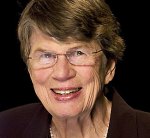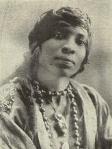 Today marks the 29th year we celebrate National Women’s History Month. My dear friend Molly Murphy MacGregor led the pioneering effort to recognize how women have impacted, shaped, and influenced our world. Molly — always very humble — is the co-founder of the National Women’s History Project (NWHP) and a key force behind why we now celebrate Women’s History Month in the United States. The not insignificant move forward started in 1980, when President Jimmy Carter issued the first Presidential Proclamation declaring the Week of March 8th 1980 as National Women’s History Week. Finally in 1987, Congress declared March as National Women’s History Month in perpetuity.
Today marks the 29th year we celebrate National Women’s History Month. My dear friend Molly Murphy MacGregor led the pioneering effort to recognize how women have impacted, shaped, and influenced our world. Molly — always very humble — is the co-founder of the National Women’s History Project (NWHP) and a key force behind why we now celebrate Women’s History Month in the United States. The not insignificant move forward started in 1980, when President Jimmy Carter issued the first Presidential Proclamation declaring the Week of March 8th 1980 as National Women’s History Week. Finally in 1987, Congress declared March as National Women’s History Month in perpetuity.
Sadly, we still see enormous resistance to treating women equally and equitably. The Republican controlled house sent a very clear message when they voted no on the equal pay act. This past February we saw Representative LaVar Christensen and Representative Brian Greene trying to defend rape, a very sad echo of Todd Akin and Richard Mourdock talking about “legitimate rape.” Yes, we continue to witness myriad vicious attacks on women and their bodies. John Boehner and his ilk seem to want property rights to every vagina in America.
Over the course of the month we will look at women pioneers and women who fought for civil rights, while we also examine the continued hypocrisy and double standards that exist, as we witness right wing extremist policing women’s eggs. Reproductive health is debated by men (Catholic Bishops? Darrel Issa‘s all-male birth control panel?) with paternalistic moralizing and no reference to women at all. Sadly, it is not just men that are trying to control women’s bodies, but a faction of self-loathing women — who have internalized male oppression — are also hurting women. Are you listening Susan G. Komen Foundation? Helping everyone learn Women’s History is the best preventative for creating any new Phyllis Schlaflys or Karen Handels.
We have much to celebrate and much work yet to accomplish.











